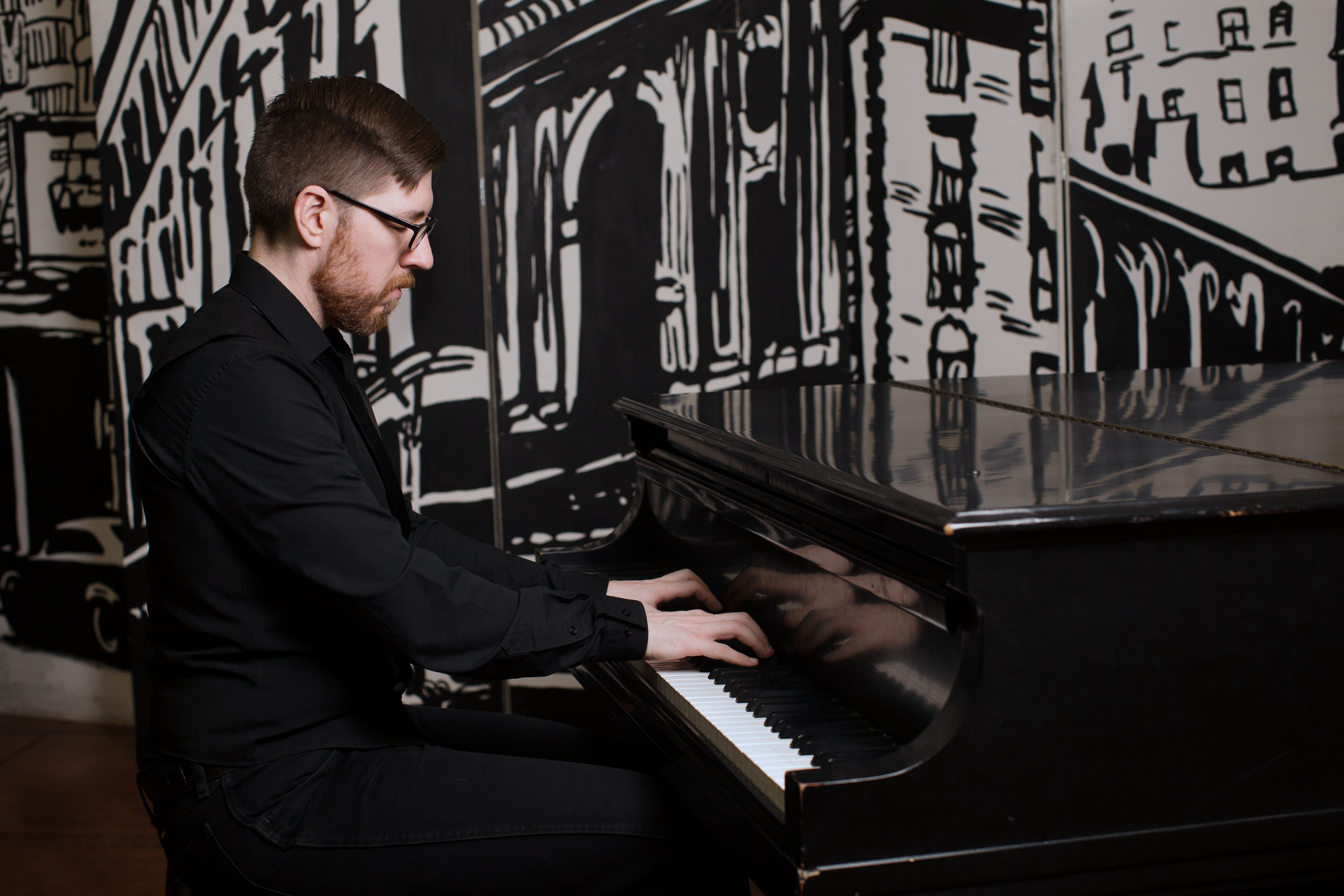Hitting the High Notes

Writer Joseph J. Airdo
Photography by Loralei Lazurek
[dropcap]O[/dropcap]ne of Topher Keene’s favorite home movies of his childhood is one that features him babbling into a microphone when he was only 3 months old.
Some might say he was just being a joyful infant, emitting nonsensical sounds to mimic the world around him. Others might call the video a form of foreshadowing, indicating a propensity toward music that would eventually mold him into who he is today—a man enriching the music education of more students than he ever could have imagined.
“I have always loved to sing, but I did not see it as a career at all for most of my life,” Keene says. “I knew that I did not want to be a professional singer but I have always loved singing in groups. Choirs and musicals were where I got my real passion. There are jobs for professional choir singers, but they are few and far between, so I kind of always set that on the back shelf.”
From a very young age, Keene knew that he wanted to help people and make a difference in the world, so he set his sights on becoming an attorney. Keene joined his school’s mock trial team and watched countless hours of law shows on daytime TV.
During his senior year of high school, Keene started to consider a career as a psychologist instead, as that would make use of his interest in how the brain works. He even applied to the University of Maine as a psychology major.
However, destiny intervened when Keene attended a summer camp for music.
“It just clicked for me,” Keene says, noting he suddenly saw choir director and music teacher as the ideal career choice considering his strengths and interests. “Once I had that lightbulb moment, I called the university and said I wanted to audition for the music program.”
After obtaining a bachelor’s degree in vocal music education from the University of Maine with additional studies at the New England Conservatory, Keene began working toward a master’s degree in curriculum and instructional design.
“I like learning and I have found that I learn the best when I share what I have learned with others,” Keene says. “Anytime I have had a subject that was important to me, I have tried to find an opportunity to become a coach, a teacher or a tutor with that subject so that I could solidify my own knowledge.”
He initially saw himself teaching high school and college students, but discovered that most singers at those age levels are not as skilled as they could be. Believing that early intervention in one’s music education is key, he began focusing his attention on teaching youth.
Music to His Ears
Keene first arrived in Phoenix for six months in 2013, during which time he worked for Great Hearts Academies. He returned to Boston for a couple of years and taught private lessons before returning to Phoenix on a permanent basis in 2015.
“The last year I spent in Boston, there was still snow on the ground in the middle of July,” says Keene, noting the Valley’s warm weather was a major factor in his decision to make a home for himself here. “I had 23 years of brutal winters, and I had as much as I could handle.”
Keene continued making a living for himself teaching private lessons, but was swiftly sought out by Phoenix Boys Choir, a Valley organization founded in 1947 that provides training in voice, music theory and performance for boys between the ages of 7 and 18.
Not really wanting a full-time gig, Keene immediately declined a job offer to lead the group’s education department. His tune quickly changed, though, when he realized the widespread difference he could make in the role.
“The flexibility to go into schools and work with teachers and college students who are training to be music educators, as well as with students from kindergarten through high school, was really inspiring to me,” Keene says.
As Phoenix Boys Choir’s director of education, Keene presents music education workshops at elementary and middle schools across Arizona at no cost to the schools. Since taking the position in 2017, he has been to about 150 schools and worked with approximately 5,500 students.
”About one-third of Arizona schools do not have music teachers,” Keene says. “Many of them have the funding, they just cannot find the candidates to actually fill the roles. So many Arizona schools do not have music programs for their students. I am able to help provide music enrichment for those schools, as well as work with the schools that already have established music programs.”



Carrying His Tune
In addition to working with Phoenix Boys Choir, Keene directs several choruses throughout the Valley, including Sounds of the Mouth Vocal Collective, Simply A Capella, Sweet Adelines Chorus and the Fountain of the Sun retirement community chorus. He is also active as a music director, having directed shows for Phoenix Theatre, Pinnacle Creative Arts and Act One Youth Theatre.
Keene also continues to teach private lessons—not only to students in the Valley, but to students all over the world via video chat. He acknowledges that there are some clear advantages to in-person lessons but has found that lessons over video chat can be quite effective as well.
“There are things that you can hear in person that you cannot hear over a microphone,” Keene explains. “And because of lag and delay, you cannot play on a piano while somebody is singing. But what I can do with video chat is record a student singing, play it back for them and show them specific things that they are doing right or wrong. I see in-person lessons and virtual lessons as completely equivalent. They just have different pros and cons.”
Keene believes that virtual lessons will become a bigger part of his career moving forward as technology improves. He even co-founded and serves as CEO for ChoirUnlimited.com, a sheet music publishing company through which he is able to donate sheet music to school districts and choirs that do not have sufficient funds in their budget to afford high-quality music.
Singing His Praises
This spring, Keene received the 2019 Outstanding Emerging Educator Award from the Organization of Kodály Educators—a group that aims to support music education, promote universal music literacy and lifelong music-making, and preserve musical heritage. The organization was founded on the principals of Zoltán Kodály, a Hungarian composer who believed that music is meant to develop one’s personality, intellect and emotions.
Keene studied the Kodály Method at the New England Conservatory and is now a level III certified Kodály educator. He also serves as a board member of the national OAKE organization as well as president of its Arizona chapter.
Although Keene is tremendously proud of his award, he remains humble and committed to making a difference in the world of music education. He stays active in his work with children so that he can remain current on best practices. He then shares his findings with other teachers so that they can be more effective with their own students.
“The work that a neighborhood teacher does at a small school, working with the same students day after day, is far deeper and more impactful than the work that I do,” Keene says. “But I have chosen to focus my life on helping those teachers do their jobs better, either by showing up in their classrooms and demonstrating some of these methodologies, or by doing professional development training for them at conferences and through school districts.”
By making a difference in music educators’ approach to their work with children, Keene’s efforts propagate through thousands of children across the country. He believes that music education is more important now than ever before.
“Nowadays, most adults do not feel comfortable singing in front of others—even just their close friends and family,” Keene says. “That is a dramatic shift in the culture from music producers to music consumers. We have created a culture of musical consumption instead of musical engagement.”
Keene hopes that if he can make a difference in a child’s music education when they are very young, an even 1% shift will make a remarkable difference in the rest of his or her life.
“For me, it is not about them ending up as professional musicians,” he explains. “That is not my concern. My concern is that, when they are 80 years old they can comfortably sing Christmas carols with their family and sing a lullaby to their great-grandchildren.”

